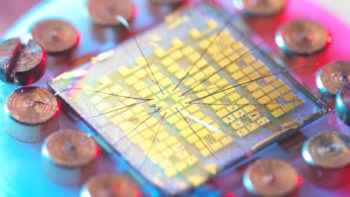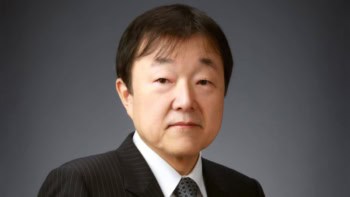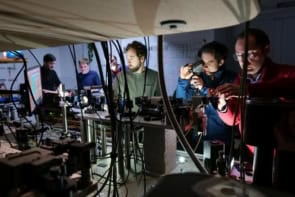Alex Belsley, Marija Radulovic, Angela Stephen and Carrie Weidner say that diversity and inclusion considerations must be at the forefront of rapidly developing fields such as quantum technologies

Creating inclusive and equitable environments in the lab and at scientific conferences is crucial if we are to foster equal opportunities for all. This involves addressing many issues such as ensuring there is a gender balance within the subject, removing language barriers and making the events accessible for individuals with disabilities. Despite progress in recent years, there remain many challenges facing physics – including in quantum technologies. Quantum technology is a burgeoning field where developments are occurring at a breath-taking rate, but we must ensure that progress does not come at the expense of cultivating a safe environment.
Such thoughts were on our minds as the organizers of BQIT (Bristol Quantum Information Technologies) workshop – an annual meeting that has been running for the past 10 years. Recently, a particular focus at the conference has been addressing issues in equity, diversity and inclusion. That’s why, since 2019 BQIT has featured panel discussions on topics such as tackling implicit bias; the impact of working conditions in academia on mental health; the effect of the COVID-19 pandemic on research; and ways in which institutions can help fight pandemic burnout and impostor syndrome.
In April, some 200 participants met at the University of Bristol for BQIT where the diversity and inclusion session, which we organized together with Alex Clark and BQIT chair Holly Caskie, was for the first time transformed into an interactive workshop. Following an introductory talk from Caroline Clark, participants were divided into groups, which included people at various stages of their career to promote diverse perspectives. Each group also had help from facilitators from the University of Bristol’s equity, diversity and inclusion team.
Although the groups debated the issues facing those in quantum technologies, our discussions touched on topics that are also relevant to many other areas of physics.
One major concern in physics is the large gender imbalance, which is caused in part from a lack of diversity in applicants and unconscious selection bias. Delegates discussed how interventions such as “blind” interviews and redefining success metrics beyond gender balance can help. Another problem concerns language barriers, which often results in a bias against non-native English speakers. This issue can be tackled by focusing on effective communication and recognizing that science ability is not limited by language proficiency. Accommodating individuals with disabilities requires accessible buildings, laboratories and equipment, including technologies such as remote experiment control.
We have to clearly communicate expectations and requirements, create suitable job roles, and promote a supportive work environment
If we are to create a more inclusive community, we also must pay particular attention to people who have caring responsibilities, who are neurodivergent or who come from minority groups. It’s vital to strike a balance between career aspirations and caring responsibilities, which means we have to clearly communicate expectations and requirements, create suitable job roles, and promote a supportive work environment. In the case of neurodiversity, one solution is to use anonymous questionnaires to help tailor workspace adjustments, while another involves cultivating socially cohesive groups to foster understanding and support. Creating an inclusive academic culture also requires us to address personal biases and learn more about the problems at hand. We also need to use techniques such as creating agile working practices, offering leadership training and creating physically inclusive workspaces.
The trouble in such a fast-moving field as quantum technology is that people end up being expected to work long hours, which can lead to a significant imbalance between work and personal life. This is especially taxing for those with fixed-term contracts, given the added pressure of traditional productivity metrics and the constant push to publish papers. That’s why we need to train supervisors in pastoral support and mental health. Unnecessary pressure can also be alleviated with robust support networks and clear expectations. Universities should also encourage staff to strike a good work/life balance and to take holidays. Flexibility is vital, especially for experimentalists who spend long hours in the lab, so we must employ arrangements that allow individuals to compensate for extended work hours with time off.
On conferences
We know that conferences are vital for researchers to collaborate and share knowledge, but they must be held at safe, accessible and welcoming venues. Meetings should feature a diverse array of participants, encourage a broad range of perspectives, and empower under-represented groups. Alternative formats like table-based poster sessions and hybrid events are useful for addressing accessibility challenges, provided that technological barriers are managed.
Conferences should also provide comprehensive support for attendees, including help with delegate fees, visas, accommodation and transport costs and even childcare facilities and on-site prayer and reflection rooms. We can also encourage people to interact in a respectful way through, for example, having pronoun badges, running structured engagement opportunities, and organizing an array of session types.
A kind, inclusive culture that celebrates teamwork is one that celebrates diverse perspectives and allows talent to flourish
If we are to build a diverse field, we also need to examine why people from under-represented groups find it hard to progress in their careers or leave physics altogether. Encouraging physicists to stay in the field means making sure they have enough money to live on, they have a good work/life balance and that we are able to be accommodating of different responsibilities that many individuals face. A kind, inclusive culture that celebrates teamwork is one that celebrates diverse perspectives and allows talent to flourish.
We call on those in senior positions in the quantum community to consider these issues and find ways to implement solutions. Future BQIT meetings will aim to implement these suggestions as best we can. The path to a truly inclusive and diverse community, especially in new and rapidly developing fields, requires continuous effort, reflection and adjustment. We now want to broaden discussions and identify further challenges within quantum technologies. Our long-term vision is a quantum community where individuals from all backgrounds have equitable access to opportunities, where diverse perspectives are highlighted and where a wealth of experiences and viewpoints can drive collaboration. We believe we can get there.



